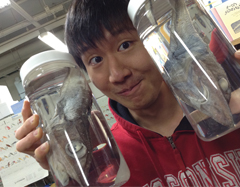February 05, 2016
Graduate, undergraduate, and high school students are invited to submit a research presentation to Sigma Xi’s Student Research Showcase. In this online contest, a presentation consists of a website that has a research abstract, a slideshow for an audience familiar with the student’s general field of research, and a video for a general audience. Judges view the web pages and ask presenters questions in the comments sections. In the process, students develop science communication skills and gain valuable feedback on their projects.
The showcase returns April 11–18, 2016. Last year’s graduate division top presenter Luka Negoita and undergraduate division top presenter Weelic Chong shared their experience and advice for this year’s participants. Below are excerpts from that conversation.
What motivated you to participate in this contest?
 Negoita: I’m really excited about trying to bridge the gap between the scientific community and a broader audience so that in and of itself was a big pull for me. The other thing is I often find it pretty hard to explain my research to a broader audience, and I wanted to get better at that. I also thought it would help me improve the research because I was presenting on a project that I hadn’t completed yet. I thought that having to explain it to a broader audience and have that discussion with a scientific and general community would help me better understand some of the aspects of the research that I was still developing.
Negoita: I’m really excited about trying to bridge the gap between the scientific community and a broader audience so that in and of itself was a big pull for me. The other thing is I often find it pretty hard to explain my research to a broader audience, and I wanted to get better at that. I also thought it would help me improve the research because I was presenting on a project that I hadn’t completed yet. I thought that having to explain it to a broader audience and have that discussion with a scientific and general community would help me better understand some of the aspects of the research that I was still developing.
 Chong: I joined the competition to push myself further in presenting my research. I had the year to do my project because it’s undergraduate thesis research, so it’s a really compact schedule. I spent most of my undergrad trying to bridge the science and nonscience divide [at my school], so this video is a natural extension of that. It’s veryinteresting to see how people respond to the video. They say, “OK, now I learned something new about your research on Parkinson’s disease,” and it makes me happy that people are interested in stuff like that.
Chong: I joined the competition to push myself further in presenting my research. I had the year to do my project because it’s undergraduate thesis research, so it’s a really compact schedule. I spent most of my undergrad trying to bridge the science and nonscience divide [at my school], so this video is a natural extension of that. It’s veryinteresting to see how people respond to the video. They say, “OK, now I learned something new about your research on Parkinson’s disease,” and it makes me happy that people are interested in stuff like that.
What do you remember about the judging period?
Negoita: It felt like I was at a conference with an oral presentation, but the number of comments was way greater than any physical conference I’ve ever been to—more details, very much of a discussion. At the end of the showcase, we received a list of specific feedback that each judge had about our presentation. I think I had around 40 judges on that list. The number of judges who commented was more around 18 or so, but then those 18 comments continued on into discussion threads and led to some interesting insights, resources, and exchanges. I think one of the greatest parts about this whole research showcase is the fact that you can have contact with so many scientists who actually volunteer their time to carefully look at your presentation and give you comments. I’m grateful for all the judges who did that.
What do you think made your presentation successful?
Negoita: Some of the more positive comments I received had to do with the general appeal to a broader audience, the broader implications of the research, and the fact that I tried to emphasize those aspects more. Some other things that might have helped were trying to be as engaged as possible with responding to comments and welcoming any and all feedback. I came at this project trying to focus on my own passion and excitement for plant ecology and trying to emphasize that in my presentation. I think that resonated with a lot of judges.
What did you learn by participating?
Chong: One thing I learned is how you actually storyboard your project. I use the word storyboard because it’s really like painting a picture for your audience. You lead them into your project, you put them through this whole process, not just “this is all my data” but also “why does it matter?”Another thing I learned is how to do something new. I didn’t know anything about making videos. Don’t be afraid—rock on with your video making or your PowerPoint presentation making, and you’ll be good.
Watch videos to hear more advice from Negoita and Chong. Or, if you would like to volunteer to judge the showcase, please fill out the sign up form by April 4.
This article was updated on March 16, 2016.